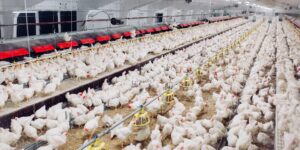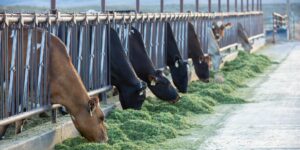You might have heard the term “greenwashing” before, but what is it, exactly? And why should you care?
After all, you buy organic, pasture-raised, grass-fed, and cage-free. That’s good, right?
Well…maybe.
The truth is, a lot of companies use these terms as a marketing ploy, but their practices don’t live up to the story they’re selling.
This, in essence, is greenwashing.
All About Greenwashing
Greenwashing is a marketing strategy that uses wording and packaging to give the appearance that a product is good for you and the planet.
It could be a sleekly-packaged shampoo labeled “all-natural,” but when you actually look at the ingredients…yikes. “All-natural” care products might still contain harmful preservatives or foaming agents as well as irritating fragrances and dyes.
Or an organic cereal that’s loaded with organically-grown yet harmful ingredients like white sugar and palm oil.
In reality, terms like “grass-fed,” “cage-free,” “natural,” and “pasture-raised” are often defined broadly and may only be loosely verified and enforced. This enables companies to exploit potential loopholes in order to use those labels on their products.
For example, cage-free chickens might not be in cages, but they can still be packed into a warehouse and may or may not have access to the outdoors. And who knows what they’re eating? (By the way, a lot of eggs have the label “vegetarian-fed.” But chickens aren’t vegetarians! They’re supposed to scratch for bugs and grubs. This makes more nutritious eggs!)

Pasture-raised is supposed to mean that the animals had access to the outdoors for at least 120 days peryear, but says nothing about the size or quality of the outdoor area. The animal may only have access to a tiny outdoor stall, or to an overcrowded dirt corral.
Grass-fed beef is supposed to mean that cattle were raised solely on grass and forage after they were weaned from their mother’s milk, but it’s easy to fudge the paperwork and sneak a little grain into their diets.
The problem is, these terms don’t tell the full story of what you’re getting. While the FDA, USDA, FSIS, or other governing bodies may outline requirements for these terms, they are difficult to enforce and leave plenty of room for loopholes. These claims are verified through the paperwork only, not onsite inspections. So, there’s no way to tell whether these terms are being applied correctly.
And to make things even more confusing, some terms, such as “naturally raised,” aren’t defined or regulated at all.
What About Organic?
Organic is a term that’s regulated by the USDA. To label their products “organic,” companies must meet certain requirements that mainly focus on what’s NOT in the product. To be considered “organic,” products must be raised (or made from ingredients) without pesticides, GMOs, and, in the case of animal products, artificial hormones or antibiotics.
However, “organic” doesn’t tell the whole story for a few reasons:
Organic is deceptive.
Many companies that are certified organic only meet the bare minimum requirements and their actual farming and animal husbandry practices aren’t that great.
After all, organic beef can still be raised on a feedlot, as long as the feed is organic. Chickens that lay organic eggs may still be overcrowded. Organically raised produce may still contribute to soil erosion and deforestation. The label may show a beautiful farm with happy cows and sunbeams spilling over the horizon, but the reality might be very different.
Organic often excludes small farms.
Organic certification is expensive, and a lot of small farms aren’t able to afford it even if their practices are stellar. You might be better off buying local meat at your neighborhood farmer’s market than buying grass-fed beef at the grocery store. Unless you can talk to the people who produced your food, you have no way of knowing what you’re getting. Transparency is key!
Organic is more about what’s NOT in your food.
The organic label says nothing about the nutritional quality of the food. Yes, organic food is free of pesticides, antibiotics, and artificial hormones, but it might also be devoid of nutrients.
Don’t get us wrong, we’ll take organic blueberries over conventional any day. Organic can be helpful when you’re in a grocery store and only have a few seconds to decide on the best products available to you.
But if your goal is nutrient density, these labels won’t help you much. (By the way, nutrient density is the ratio of nutrients to calories in a given food. In other words, it’s the nutritional bang for your buck! We strive to pack more nutrients into our products through sound, traditional farming practices that nourish our animals. Healthy animals = healthy meat, milk, and eggs!)
Why isn’t Redmond Certified Organic?
This is a question we hear a lot. Our answer? We could get certified if we wanted to, but honestly, it’s not a priority.
We haven’t bothered with organic certification because we’re not worried about conforming to labels. We’re concerned with what’s actually in your food. However, we do take care to ensure that all of our meat, eggs, and dairy are completely free of artificial hormones, antibiotics, and pesticides. Our dairy cows and chickens eat grass or 100% organic hay (for the cows) and feed (for the chickens).
Where Does Redmond Stand on Greenwashing?
Our priorities are nutrient density, animal health, and sustainability. More than labels, we’re focused on what’s actually in your food.
We feed, breed, and care for our animals in a way that promotes maximum nutrition, even if it’s not as idyllic as the pretty picture on the label of a carton of greenwashed yogurt.
We don’t worry about the labels or the pretty pictures. We do what makes sense.
For example, we could say our dairy cows are on pasture all year, but that wouldn’t be true.
After all, we’re in Utah. It snows. It wouldn’t make sense to put our cows on pasture in the winter or they’d go hungry. This might also be the case late in the summer if the grass has dried out. (PS: diet also affects the flavor of the milk and trust us, you don’t want milk from a cow that’s had nothing to eat but dry, scrubby grass!)
So, when pasture isn’t available or plentiful, our herd gets the highest quality organic hay we can get our hands on.
Our chickens do spend most of their time outside, but their area is netted in to protect them from predators and keep them separate from our cows. Does it look pretty? No. Does it make more sense from an animal welfare point of view? Yes. This might not fit the idea of “free range,” but it’s better for the chickens.
These are the realities of producing nutritious animal products. Sometimes you have to fill in the gaps to keep the animals happy and healthy. When nature provides, great! When it doesn’t, we step in.
Nature is dynamic, ever-changing, and unpredictable. We have to be nimble and ride the waves. (Or winds, droughts, blizzards, heat waves, whatever!)
We’re constantly learning and improving.
We keep a close eye on the science and do what works for our animals and our priorities. Science is ever-changing, so we keep a close eye on the latest findings (as well as time-honored traditional practices) and adjust our methods accordingly.
We study the best methods for working with Utah’s unique climate and ecosystem so we can harmonize with nature as much as possible. We’re always seeking out ways to be better stewards of the land, nourish our animals and soil, reduce our energy and water consumption, and improve the quality of our products. It all ties together!
What we put in our bodies matters just as much (if not more) than what we keep out.
We care more about transparency than frequently misused labels. We do use some of these unregulated terms such as pasture-raised and grass-fed, but we actually mean them.
Those terms are just the beginning.
We’re proud to bring you the highest quality, most delicious, and nutrient-dense food around, and we aim to be as transparent as possible about our methods. Thank you for taking this journey with us!
Sources:
ask.usda.gov
certifiedhumane.org
fsis.usda.gov
ams.usda.gov
fda.gov



